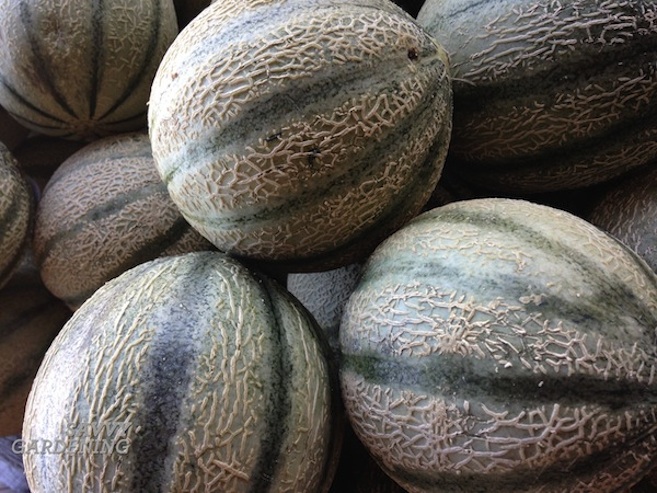This post may contain affiliate links. If you make a purchase through links on our site, we may earn a commission.
Melons do not mind their manners – at least as far as their growth habits are concerned. A single rambling vine a of standard melon variety can cover up to 100 square feet of garden space, and many gardeners don’t have that kind of room to spare. It’s sad to think that delicious and nutritious homegrown melons are taken off the menus of many gardeners because of space restrictions. This is specially true knowing that it doesn’t have to be this way. Bush-type mini melons for small gardens are the perfect choice, taking up little room yet producing much like their full-sized brethren.
5 favorite mini melons for small gardens and containers:
1. ‘Golden Jenny’ is a yellow-fleshed, short-statured variant of the classic, green-fleshed heirloom variety ‘Jenny Lind’. Both selections are unique for the knob, or turban, at the blossom end of each fruit. ‘Golden Jenny’s’ golden flesh is super sweet and her netted green skin turns yellow when the fruits are ripe. They also slip easily from the vine. An early, productive variety that matures in about 75 days, ‘Golden Jenny’s short, bushy vines don’t take up much room but produce quite prolifically. (Seed Source)
2. ‘Minnesota Midget’ is a personal favorite for its fast maturation – it reaches maturity in a mere 70 days – and its sugary sweet flesh. The very small, very compact plants reach only three to four feet across yet still produce numerous fruits, up to six per plant! The orange-fleshed fruits are small, measuring only four inches across, making this variety an exceptional choice for container growing, too. (Seed Source)
3. ‘Sleeping Beauty’ was introduced in the late 1990s and is best known for its compact vine and delicious yellow-orange fleshed fruits. Ripe fruits reach only a half pound in weight and the netted skin has deep ribbing and turns a pale yellow when ripe. Plants reach maturity in 85 days. (Seed Source)
4. ‘Green Machine’ matures in 85 days and bears fruit that is absolutely incredible – not only in flavor and appearance, but also in number. The compact vines produce mass quantities of two pound melons, each with lovely green flesh that tastes divine. The skin is netted and fruits fall from the vine when ripe. (Seed Source)
5. ‘Honey Bun’ is a bush variety that is not only compact in stature, but also bears the cutest lil’ fruits. Measuring just five inches across, each honey-flavored fruit has deep orange flesh and a classic, netted cantaloupe skin. Each vine produces three or four fruits in about 75 days that fall from the vine when ripe. (Seed Source)
How to grow mini melons
- Select a site that receives at least eight hours of full sun per day.
- Work compost or another source of organic matter into the soil before planting.
- Wait to plant until the danger of frost has passed and the soil has warmed.
- Sow seeds directly into the garden (or container), 1 inch deep and 18 inches apart.
- Mini melons need ample moisture throughout their growing season. Irrigate the planting bed or container regularly and do not let it dry out completely.
- If you’re growing these mini melons for small gardens in the ground, a 2-3 inch thick layer of straw mulch helps keep the roots moist and limit weed competition.

- If you’re growing them in containers, use a liquid organic fertilizer (my favorite is this one) every three weeks throughout the growing season.
- These mini melons will be ready to harvest when they easily slip from the vine
I’m sure you’ll find these mini melons for small gardens to be as delicious and productive as I do.
Have you grown mini melons before? Which varieties are your favorites? We’d love to hear about them in the comment section below.
For more information on compact plants for small gardens, check out these other posts:
- The best dwarf veggie varieties for containers and micro plots
- Narrow trees for small gardens and tight spaces
- Grow a small-scale berry garden
Pin it!




With our short growing seas we were so excited to try Minnesota Midget last year, but were horribly disappointed. Found it to be completely flavorless and not worth eating. I hear such good things–wonder what our problem was.
Too much watering at the end of the ripening season will dilute the flavor of any melon… got to keep them thirsty at the and.